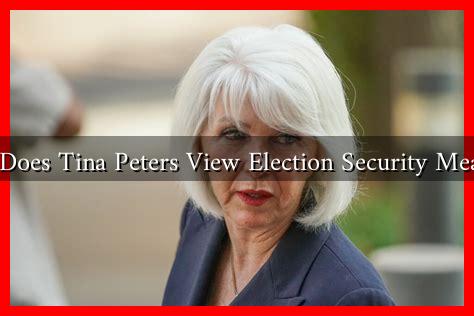-
Table of Contents
How Does Tina Peters View Election Security Measures?
Tina Peters, the former Mesa County Clerk and Recorder in Colorado, has become a prominent figure in the national conversation surrounding election security. Her views, shaped by her experiences and controversies, reflect a complex relationship with the integrity of the electoral process. This article delves into Peters’ perspective on election security measures, examining her actions, beliefs, and the broader implications for the electoral system in the United States.
The Background of Tina Peters
Tina Peters gained national attention in 2021 when she was accused of allowing unauthorized access to voting machines in her county. This incident sparked a debate about election security and the integrity of voting systems. Peters has positioned herself as a whistleblower, claiming that her actions were motivated by a desire to expose vulnerabilities in the electoral process.
Peters’ Views on Election Security
Peters has been vocal about her concerns regarding election security, often emphasizing the following points:
- Vulnerability of Voting Machines: Peters argues that many voting machines are susceptible to hacking and manipulation.
. She believes that the lack of transparency in how these machines operate poses a significant risk to the integrity of elections.
- Need for Audits: Peters advocates for comprehensive audits of election results. She contends that routine audits can help identify discrepancies and ensure that votes are counted accurately.
- Public Trust: Peters emphasizes the importance of public trust in the electoral process. She argues that without transparency and accountability, citizens will lose faith in the democratic system.
Controversies and Legal Challenges
Peters’ views on election security have not come without controversy. Following her actions in 2021, she faced legal challenges, including accusations of tampering with voting equipment. These controversies have led to a polarized perception of her as either a champion of election integrity or a perpetrator of misinformation.
In 2022, Peters was charged with multiple felonies related to her alleged actions, which included unauthorized access to voting equipment and data. This legal battle has further fueled the debate over election security, with supporters viewing her as a martyr for the cause, while critics argue that her actions undermine the electoral process.
Public Response and Support
Peters has garnered a significant following among those who share her concerns about election integrity. Many of her supporters believe that her actions have shed light on critical issues within the electoral system. Key points of support include:
- Grassroots Movements: Peters has inspired grassroots movements advocating for election reform and increased security measures.
- Media Attention: Her story has been covered extensively in conservative media, framing her as a defender of democracy.
- Political Alliances: Peters has aligned herself with various political figures and organizations that prioritize election security, further amplifying her message.
Case Studies and Statistics
To understand the broader implications of Peters’ views, it is essential to consider case studies and statistics related to election security:
- Cybersecurity Incidents: According to a report by the Cybersecurity and Infrastructure Security Agency (CISA), there were over 1,000 reported incidents of cyber threats to election systems in the 2020 election cycle.
- Public Perception: A 2021 survey by the Pew Research Center found that 61% of Americans believe that election security is a significant issue, highlighting the widespread concern over the integrity of the electoral process.
Conclusion: The Future of Election Security
Tina Peters’ views on election security measures reflect a growing concern among many Americans regarding the integrity of the electoral process. While her actions have sparked controversy and legal challenges, they have also ignited a national conversation about the need for transparency, accountability, and robust security measures in elections.
As the debate continues, it is crucial for policymakers, election officials, and citizens to engage in constructive dialogue about how to enhance election security while preserving public trust. The future of democracy may depend on our ability to address these challenges head-on.
For more information on election security measures, you can visit the Cybersecurity and Infrastructure Security Agency (CISA).





